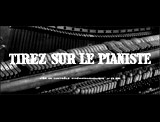
|
Shoot the Piano Player (1960, Fr.)
(aka Tirez Sur le Pianiste)
In François Truffaut's improvisational, noirish
crime-gangster drama with humor, an arthouse New Wave film with a
mixing of genres - his second feature film:
- in a lengthy flashback halfway through the film,
a survey of the haunted past life of honky-tonk Parisian dive piano
player Charlie Kohler (Charles Aznavour) as once-famous classical
pianist prodigy Edouard Saroyan, and the tale of the ultimate suicide
of his adulterous, cool blonde cafe waitress wife Therese (Nicole
Berger)
- in the flashback, Edouard was called for an audition
with impresario Lars Schmeel (Claude Heymann) - and the view of his
walk down a long corridor and a montage of increasingly closer and
closer views of his finger fearful of ringing the doorbell - but
then when the door opened, the camera unexpectedly tracked backward
on an attractive female - an expressionless violinist auditioner
who exited down the long hallway and out of the building, while Edouard's
piano audition was heard on the soundtrack - presumably, she had
been rejected and he was chosen
- the scene of Therese's painful confession to husband
Edouard that she slept with Schmeel to help him get ahead: ("You
know how a spider works? It was like he'd cut me in two. As if my
heart were one thing and my body another. It wasn't Theresa who went
with him. Just her body, as if I wasn't there. I was with you"),
but Edouard walked out on her, causing her to suicidally throw herself
to her death on the pavement below from the apartment room balcony
- Edouard's new existence and refuge as Charlie - although
he was drawn back into seamy underworld gangster involvement through
the exploits of his two brothers - double-crossing petty-crooks:
Chico (Albert Rémy) and Richard (Jean-Jacques Asianian)
- Chico's viewpoint of Charlie's occupation: "What's
the idea? You look cute playing that battered old crate, when you
should be playing a concert grand with people clamoring for encores...But
look at him. A virtuoso playing this kind of trash" - Charlie
responded:
"I can't be in two places at once"
- the performance of Italian waiter and chanteur (Boby
Lapointe) with the bawdy song "Framboise" about his wife's
breast enlargements - with sing-along lyrics to follow along on the
screen:
"Her measurements were meager, No wonder she was eager, To be
adding extra padding at the Beauty Institute Ah! Ah! Ah! By the Loire
are beauticians, Who can add to your bosom, Not surgical dangers in
Angers, For old gents and pretty maids, Attributes are custom-made,
But for those who can't rejuvenate, What a blight!, A blight on the
Berry, That's fate, tit for tat, Seeing her new measurements, Added
to my torments, Ogling her plunging neckline, I gave her the old line:
Permit me to keep abreast, Of what's on your chest, She ran away like
a stranger, so I quit..."
- director Truffaut's various experimental cinematic
flourishes, including a triple iris, sudden jump cuts and tone changes,
kinetic and hand-held camera shots, split screen, etc.; in one famous,
humorous, and totally-unexpected sequence, gangster Momo (Claude
Mansard) vowed his honesty by swearing: "If I'm lying, may my
mother drop dead this instant" - a cut was made to a dark room
where an older woman fell over dead with her heels kicking up
- Charlie's humorous and teasing relationship with his
neighbor, lovely, dark-haired prostitute Clarisse (Michèle
Mercier); when she climbed into bed with him
- topless, he mentioned: "This is how it's done in the movies" and
covered her bare breasts with the sheet; then, she mentioned
she had gone to the movies: "I did go to the movies this afternoon.
I saw Torpedoes in Alaska... It's a picture with John Wayne,
to show that the Americans want peace"
- Charlie's growing love for gorgeous, fresh-faced barmaid
girlfriend Léna (Marie Dubois) - and the sequence of the two
walking down a street, while Charlie nervously attempted to hold
her hand, or put his arm around her waist (with close-ups of his
hand and fingers) - he mused to himself, in voice-over: "It'll
look odd if you don't talk. Say something, anything, or she'll think
you're scared. She's no fool. She knows silence and romance go hand-in-hand.
She's the quiet type. Not stuck-up - just serious. No cheap jokes
for her. It'd take something really funny to make her laugh" -
he made a grimacing face and she laughed, surprisingly
- the sequence of Charlie's lethal fight after the betrayal
of jealous bartender boss Plyne (Serge Davri) in conflict over Lena;
Plyne complained: "I don't love Lena anymore. She used words
unworthy of her. If she had a soul, she wouldn't have been so vulgar.
She's a slut. A woman is pure, delicate, fragile. Woman is supreme.
Woman is magic. Charlie boy, sorry for getting familiar...but Charlie
boy, you're about to die"; when Charlie was placed in a strangling
chokehold, he self-defensively stabbed Plyne in the back with a butcher
knife, and then was forced to become a fugitive
- the film's tragic conclusion in the snowy, icy Alps:
the accidental gunning down death of Lena, caught in the cross-fire
during a shootout between Charlie's brothers and two other relentless
gangsters: Momo (Claude Mansard) and Ernest (Daniel Boulanger); her
body slid down an icy slope before it came to rest
- the film's closing line in its poignant ending, after
Charlie had returned to his occupation (after being cleared of murder
charges), he was introduced to a newly-hired barmaid by bar-worker
Mammy (Catherine Lutz): "Charlie, meet the new barmaid. Charlie!
The piano player!" - before he took the stage to again play
the piano as the film concluded
|
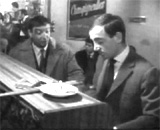
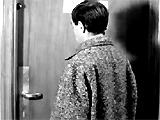
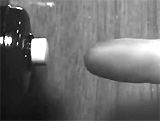
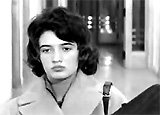
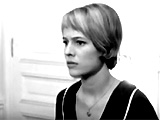
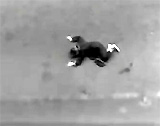
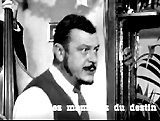
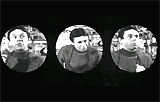
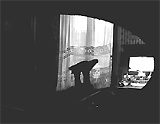
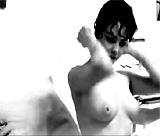
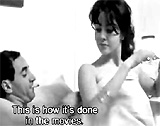
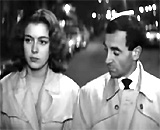
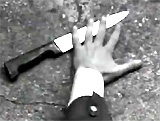
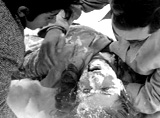
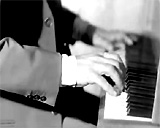
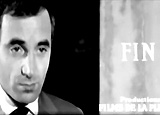
|

















